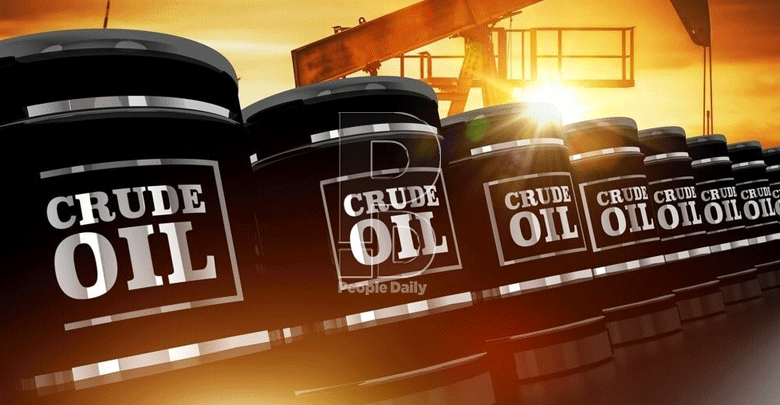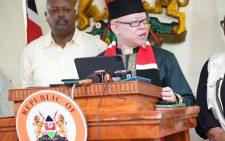Some ten top African nations in oil capacity and production

Africa’s crude oil reserves remained stable in 2020 having accumulated 125.8 billion barrels. From a country perspective, as Kenya struggled to start exportation, Libya emerged top with largest amount of crude oil reserves in the continent at 48.36 billion barrels. When it comes to oil refining, Egypt led, with a refinery capacity of 814,000 barrels per day.
South Sudan
Sudan and South Sudan reached a deal to ramp up oil production to 300,000 Barrels Per Day.
South Sudan and Sudan have reached a deal to increase oil production from the current 170,000 barrels per day (BPD) to 300,000 BPD within the next three years from 2021.
Blocks 3 and 7 in Great Upper Nile is operated by Dar Petroleum Operating Company, and they are producing around 130,000 bpd, which sometimes drops due to logistic and other challenges.
In Blocks 1, 2 and 4 we are producing around 52,000 bpd at the moment, which is projected to be around 60,000 bpd.
Production fluctuates by the day, with some signs that Greater Pioneer Operating Co. (GPOC) may be lower.
South Sudan’s commitments to reduce output to OPEC+ came before GPOC’s Blocks 1, 2 and 4 had resumed.
Nigeria
Nigeria was the leading oil producer in Africa as of 2020. Oil production amounted to 101.4 million metric tons in the country. Nigeria was also the largest crude oil exporter in the continent.
The country sold more than two million barrels of oil daily to the international market in 2020.With 18 operating pipelines and an average daily production of over two million barrels in 2020, Nigeria is the eleventh largest.
The petroleum industry accounts for about nine percent of Nigeria’s GDP and for oil producer worldwideover 90 percent of all export value.
Angola
The oil production in Angola decreased in October 2020 to 1.33 million barrels per day, the lowest level registered in the last ten years.
Angola is the second biggest oil producer in Sub-Saharan Africa. The commodity is vital to the country’s economy, with massive contributions to the Gross Domestic Product (GDP).
Its current challenge is how to reverse the decline in oil production observed in the last decade.
To recover oil output also means getting the economy back on track, as the country’s finances rely strongly on this resource.
Around one third of Angola’s GDP is rooted in the oil industry. Crude oil, natural gas, and refined oil account for almost all national exports.
Algeria
Along with gas, Algeria is a large oil producer with 12.2 billion barrels of proven oil reserves.
The country exports 540,000 barrels of its total production of about 1.1 million barrels. All proven oil reserves are held onshore, though offshore exploration is in the early stages.
Algerian government has stressed the importance of involving foreign partners to increase oil and gas reserves and explore new territories.
Algeria opened a new set of oil and gas fields to international bidders in January 2014.
The tender, launched by Algeria’s state-owned oil licensing body Alnaft, covered 33 concessions.
Libya
Libya holds 48.363 billion barrels of proven oil reserves as of 2016, ranking 9th in the world and accounting for about 2.9 per cent of the world’s total oil reserves of 1.65 trillion barrels.
Crude output surged from almost nothing from September and reached 1.25 million barrels a day last month, the highest level in eight years.
Libya has proven reserves equivalent to 594.2 times its annual consumption.
This means that, without Net Exports, there would be about 594 years of oil left (at current consumption levels and excluding unproven reserves).
Egypt
Egypt’s proven hydrocarbon reserves stood at 3.3 billion barrels of oil and 77.2 trillion cubic feet (tcf) of natural gas at the end of 2020.
Egypt encourages international oil companies (IOC) to participate in the oil and gas sector, and currently more than fifty IOCs are operating in Egypt.
Egypt has signed around 83 oil and gas exploration deals with IOCs between November 2013 and February 2020, worth about $15.5 billion (Sh1.675 trillion).
It has also offered signing bonuses of more than USD 1 billion for the drilling of 319 wells.
In 2020, nine petroleum agreements have been signed for oil and natural gas exploration with a minimum investment of around $452.3 billion (Sh48.8 trillion) in the Mediterranean and Western Desert regions.
Congo Brazzaville
Congo Brazzaville’s proved crude oil reserves were approximately 2.9 billion barrels at the beginning of 2021, according to the estimates by the Oil & Gas Journal (OGJ), which is down from 3.0 billion barrels in the previous year.
The Congolese government introduced a revised Hydrocarbons code in 2016 to replace the 1994 version of the law.
This legislation mainly governed hydrocarbon activities in Congo Brazzaville.
Therefore, SNPC Congo remains the exclusive concessionaire of petroleum exploration and production permits, and it continues to have a minimum participating interest of 15 per cent.
Gabon
Gabon is a mature oil producer in West Africa, and its government derives a significant amount of its revenue from crude oil production.
Revenue from petroleum and other liquids represents about 45 per cent of gross domestic product (GDP), and petroleum and other liquids exports accounted for nearly 74 per cent of total export revenue in 2020.
Gabon is among the top five oil producers in sub-Saharan Africa and has 2 billion barrels of proved crude oil reserves, including lease condensate reserves, according to the Oil & Gas Journal.
The East African region
Ever since 2006 and the first discoveries, Uganda set the pace and now the entire region has become a hotspot for oil exploration.
More reserves are yet to be found in the Kenyan and Ethiopian region of Lake Turkana and offshore along the coast of Kenya, Tanzania and Mozambique.
However, according to theglobaleconomy.com, the average value for Kenya during the 1908-2021 period is still 0 billion barrels, adding that for comparison, the world average in 2021 based on 187 countries is 8.87 billion barrels.
The East African Crude Oil Pipeline is touted as the project that will unlock East Africa’s future by taking Uganda’s oil to the rest of the world.
Equatorial Guinea
Equatorial Guinea holds 1.1 billion barrels of proven oil reserves ranking 39th in the world and accounting for about 0.1 per cent of the world’s total oil reserves of 1,650,585,140,000 barrels.
Equatorial Guinea has proven reserves equivalent to 579.6 times its annual consumption.
This means that, without Net Exports, there would be about 580 years of oil left (at current consumption levels and excluding unproven reserves).
Equatorial Guinea produces every year an amount equivalent to 8.1 per cent of its total proven reserves and consumes 5,200 barrels per day. The West African nation exports 77 per cent of its oil production.









